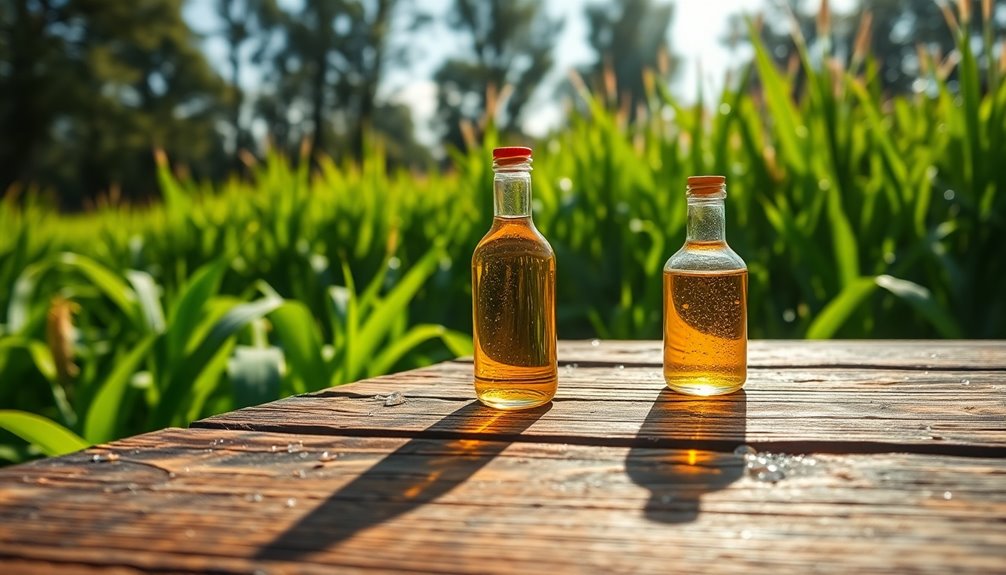Researchers have developed sustainable cleaning detergents derived from wood and corn to meet your demand for eco-friendly solutions. These innovative products use cellulose nanofibers and corn proteins to enhance cleaning power while being gentle on the environment. You can expect effective stain removal with minimal residues, making them a smart choice for a cleaner planet. This shift toward biodegradable formulations not only protects ecosystems but also encourages responsible choices. There's more to discover about this exciting movement in sustainable cleaning!
Key Takeaways
- Sustainable detergents are being developed from renewable ingredients like cellulose nanofibers from wood and zein protein from corn.
- Cellulose nanofibers enhance stain removal, while zein protein stabilizes emulsions and captures oils effectively.
- These eco-friendly detergents are biodegradable, minimizing environmental impact and preserving aquatic ecosystems.
- Performance studies indicate wood-based detergents can outperform traditional powders in cleaning efficacy at higher concentrations.
- Economic viability is being explored to ensure widespread adoption of these innovative cleaning solutions for a cleaner planet.

In today's world, the shift towards sustainable cleaning detergents isn't just a trend—it's a necessity. Traditional cleaning products often contain harmful chemicals that can wreak havoc on ecosystems. You mightn't realize it, but those synthetic detergents you're using are likely difficult to break down and can contribute to environmental degradation.
Thankfully, researchers are stepping up, developing detergents made from renewable ingredients like wood fibers and corn proteins. This innovation not only reduces your reliance on non-renewable materials but also aligns with the growing consumer demand for eco-friendly alternatives.
These new sustainable detergents utilize cellulose nanofibers derived from wood, which possess unique properties that help attract and repel water, making stain removal more effective. Zein protein from corn plays a crucial role too, stabilizing emulsions and trapping oils to enhance cleaning capabilities.
Sustainable detergents harness wood-derived cellulose nanofibers and corn proteins for superior stain removal and eco-friendly cleaning power.
By incorporating plant-based surfactants, these formulations aren't only biodegradable but also gentle on your skin and the environment. Plus, natural enzymes are included to break down organic stains more efficiently while remaining eco-friendly. Biodegradable formulations reduce the ecological footprint of cleaning products and help preserve aquatic ecosystems.
When it comes to performance, you might be surprised to learn that wood-based detergents can outperform traditional laundry powders, especially at higher concentrations. Researchers have conducted comparison studies, showing that these sustainable options leave minimal to no residue on fabrics and surfaces.
As they explore the economic feasibility of mass production, you can feel good knowing that you're supporting a cleaner planet. These sustainable cleaning solutions aim to minimize energy consumption and carbon footprints during production.
Embracing such products means you're actively participating in a larger movement towards green chemistry, which is committed to creating detergents with minimal environmental impact. By choosing these innovative cleaning products, you're making a conscious choice to protect the planet while ensuring your home stays clean and fresh.
Sustainable cleaning is here to stay, and it's time to make the switch.
Frequently Asked Questions
Are These Sustainable Detergents Safe for Sensitive Skin?
Yes, these sustainable detergents are generally safe for sensitive skin.
Their natural ingredients, like cellulose nanofibers and zein protein, reduce irritation compared to synthetic options.
You'll find they often maintain a skin-friendly pH, crucial for preventing discomfort.
Plus, the absence of harsh chemicals and allergens minimizes the risk of allergic reactions.
How Do Wood and Corn-Based Detergents Compare to Traditional Options?
Imagine you're at a friend's house, struggling to remove a stubborn chili oil stain from their favorite shirt.
You grab a wood and corn-based detergent, amazed at how effectively it lifts the stain compared to traditional options.
These natural detergents clean just as well, if not better, without the harsh chemicals found in many conventional brands.
Plus, they're eco-friendly, making them a great choice for both your fabrics and the planet.
Where Can I Purchase These Sustainable Cleaning Products?
You can usually find sustainable cleaning products at health food stores, eco-friendly shops, or online retailers specializing in green products.
Websites like Amazon or dedicated cleaning product sites often stock these items. Also, check local supermarkets; many are expanding their eco-friendly selections.
If you're looking for something specific, visiting the manufacturer's website might direct you to retailers or provide purchase options.
Always look for certifications to ensure you're getting a truly sustainable product.
Are There Any Environmental Certifications for These Detergents?
Have you ever wondered what guarantees a product's environmental friendliness?
There are indeed various environmental certifications for detergents. Look for labels like EcoLogo, Green Seal, or USDA Certified Biobased Product.
These certifications ensure that the cleaning products meet strict ecological standards, reducing harmful impacts.
When you choose certified detergents, you're not just cleaning your space; you're also making a positive choice for the planet.
It's a small step toward a more sustainable future.
What Is the Shelf Life of Wood and Corn-Based Detergents?
You might find that the shelf life of wood and corn-based detergents isn't explicitly defined.
However, like many natural products, their efficacy depends on proper storage conditions—keeping them in a dry, stable environment is key.
While traditional liquid detergents typically last 12 to 18 months, the exact shelf life for these eco-friendly alternatives isn't well-documented.
It's best to check for any packaging guidelines to ensure optimal performance.
Conclusion
In conclusion, sustainable cleaning solutions, like the innovative detergent derived from wood and corn, are not just eco-friendly but also effective. Research shows that using plant-based ingredients can reduce greenhouse gas emissions by up to 30% compared to traditional detergents. By choosing these sustainable options, you're not only keeping your home clean but also contributing to a healthier planet. It's time to embrace products that align with both your cleaning needs and environmental responsibility.









